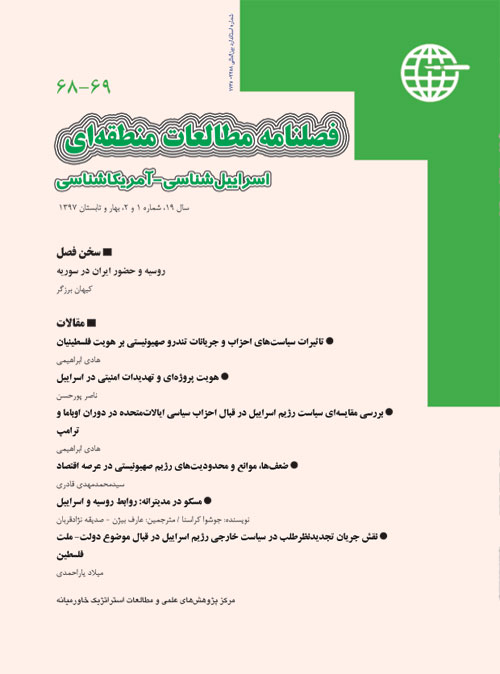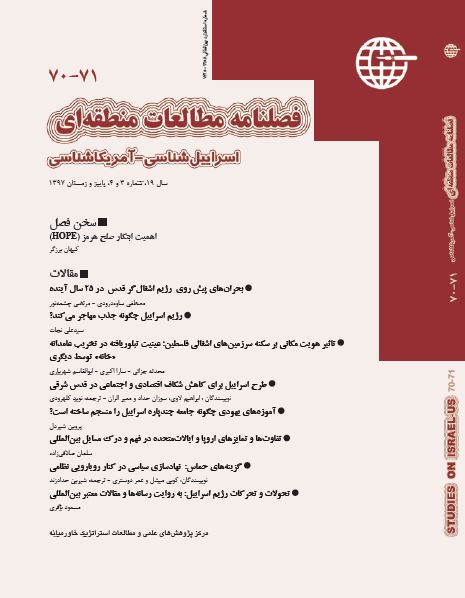فهرست مطالب

نشریه مطالعات منطقه ای
سال نوزدهم شماره 1 (بهار و تابستان 1397)
- اسراییل شناسی - آمریکا شناسی
- بهای روی جلد: 300,000ريال
- تاریخ انتشار: 1398/11/15
- تعداد عناوین: 7
- سخن فصل
-
صفحه 7
- مقالات
-
Page 11
This paper argues that the idea of land for peace and establishment of two Jewish and Palestinian state, is obsoleted. Therefore, the author believes that right-wing extremist parties trying to annex the 1967 occupied lands (except Gaza) to the 1948 lands. But according to the existed facts, Palestinian resistance against these Zionists plans by focusing on their Islamic and national identity is continued. So, Israel is facing different challenges as result of the mentioned policies.
Keywords: Zionism, Palestine, Identity, Right-Wing -
Page 29
This paper is trying to explore the relation between security and identity- building in Israel. The paper assumes that Israel as a new state, has created through identity building project which has been started from 1897 and 1948. Since this project leads to strengthening resistance identity, therefore emphasizing on reconstructing the project, will reconstruct resistance identity as well. Paper concludes that, Israel security is threatening by resistance identity within Judaism (especially Neturei Karta), some of Israeli citizens (Israeli Arabs), fighting groups in Gaza strip and West Bank as well as resistance groups in the Middle East.
Keywords: Project Identity, Resistance Identity, IslamicResistance -
Page 53
This paper highlights that Israel by using a multilateral diplomacy tries to impact all political, social, economic and even academic structures of the United States. Through this diplomacy the author argues that, Israel seeks to keep the U.S. committed to su pporting Israel. The assumption is that Israel pragmatically and by presence of Israeli diplomats, journalist and businessmen in different circles of Republicans or Democrats, directly and indirectly attempts to apply its policy based on the principle of the U.S. comprehensive defense of Israel.
Keywords: Foreign Policy, Political Parties, Party Diplomacy, Democrats, Republicans -
Page 81
Since there are different political systems in addition to oil as an influential tool in the economics, analysis of macroeconomic issues of Middle Eastern countries is not an easy task. Although Israel’s economy is Europeanized and differ from other ME’ economic systems, but still has pores. This paper reviews the economic situation and its weaknesses, obstacles and constraints of the Zionist regime. Additionally, the paper attempts to identify important features of Israel’s economic vulnerabilities.
Keywords: Zionist Regime, Middle East, Economics, Inequality, Foreign Trade -
Page 101
This paper explores the relations between Israel and Russia. It argues that this relation has been developed after 2000 when Putin had come to power. During Syria’s conflicts, both sides have recognized each other as an important player in the region and try to solve their tensions. On one hand, Moscow has regional alliances like Iran and Syria, also Russia now has closer proximity to Israel through Golan Heights, on the other hand, Israel as a regional power is capable of disrupting Moscow’s planned strategic architecture in the Middle East.
Keywords: Russia, Israel, Syria -
Page 135
This paper examines the Israeli revisionists on two-state solution and reviews its role on the foreign policy of Israel towards the Palestinian issue by using a descriptive-analytical approach. The main assumption of the paper is that; revisionists are against establishment of an independent state called Palestine.
Keywords: Revisionists, Jabotinsky, Israel’s Foreign Policy, Palestine, Constructivism


